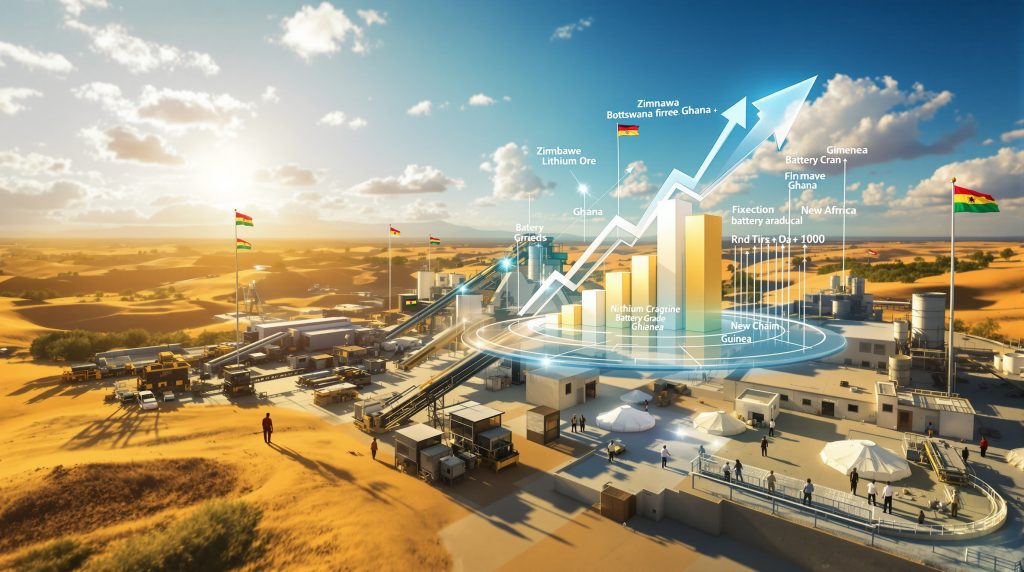African Resource Nationalism: The Push for Local Value Addition
Africa's mineral-rich nations are increasingly asserting sovereignty over their natural resources through strategic policies that emphasize domestic processing and value addition. This shift represents a new wave of resource nationalism focused less on outright nationalization and more on economic development and supply chain positioning. As global demand for critical minerals transition surges, African governments are implementing measures to ensure their citizens receive greater benefits while securing advantageous positions in emerging global supply chains.
The Changing Face of Resource Nationalism
Resource nationalism in Africa has evolved significantly from its historical roots. While previous waves often centered on political control and nationalization, today's approach is primarily driven by economic imperatives.
Australian High Commissioner to Ghana Berenice Owen-Jones notes that current resource nationalism is "being driven largely by economic imperatives, rather than political narrative," representing a more sophisticated understanding of global markets and value chains.
Modern resource nationalism in Africa typically includes:
- Greater regulatory oversight of mining operations
- Increased taxation and royalty structures
- Enhanced local content requirements
- Mandatory in-country processing and value addition
- Strategic government participation in mining projects
These policies reflect growing awareness among African governments of their leverage in a world hungry for minerals essential to energy transition technologies.
What's Driving the Push for Local Value Addition?
Economic Transformation Imperatives
African nations are increasingly rejecting the traditional extractive model where raw materials leave the continent with minimal processing. This colonial-era approach has historically delivered limited economic benefits while leaving countries vulnerable to commodity price fluctuations.
Key economic drivers behind value addition policies include:
- Desire to capture more value from mineral resources
- Job creation through downstream industries
- Technology transfer and skills development
- Economic diversification beyond raw material exports
- Increased tax revenue from higher-value products
Zimbabwe's Ambassador to Australia Joe Tapera Mhishi explains that "the subject of value addition across Africa, not only in mining but in many other sectors of the economy, has gained credence" as countries seek to transform their economic relationships with foreign investors.
Continental Coordination Through the African Union
The African Union has elevated value addition to a continent-wide priority, creating frameworks for coordinated approaches to resource governance. According to Ambassador Mhishi, this collective strategy is directly connected to "the African Union's continent-wide agenda."
This pan-African approach aims to:
- Strengthen collective bargaining power with multinational corporations
- Develop regional value chains and markets
- Harmonize policies to prevent a "race to the bottom"
- Pool technical expertise and investment resources
- Create economies of scale for processing facilities
Critical Minerals and Global Supply Chain Positioning
The global energy transition has dramatically increased demand for minerals like lithium, cobalt, copper, and rare earth elements, many of which are abundant in Africa. This creates a strategic opportunity for African governments to:
- Secure advantageous positions in emerging supply chains
- Develop processing capabilities for energy transition minerals
- Reduce dependence on foreign processing (particularly Chinese)
- Leverage mineral wealth for technological advancement
- Negotiate better terms with technology manufacturers
Owen-Jones highlights that West Africa in particular "has become a nexus of competition for resources, particularly critical minerals, with China currently holding an advantage in processing." This global competition provides African nations with increased leverage in negotiations.
Where Is Resource Nationalism Most Pronounced?
West Africa's New Mining Codes
Several West African nations have introduced similar mining codes that prioritize government control and local benefits. Owen-Jones notes that these codes share common features: "greater regulatory control, increased taxes, and greater local content" with an "emphasis on in-country value-add and, in some cases, greater government ownership."
| Country | Key Policy Changes |
|---|---|
| Ghana | Increased regulatory oversight, higher taxes, Atlantic Lithium project requirements |
| Guinea | Greater state participation in Simandou iron ore project, infrastructure development mandates |
| Mali | Revised fiscal terms, increased government equity stakes |
| Burkina Faso | Enhanced local processing requirements, community development provisions |
Owen-Jones references approximately A$30 billion invested by Australian companies across nine West African nations, demonstrating the region's continued attraction despite changing regulatory frameworks.
The "Coup Belt" and Resource Control
Military takeovers in several resource-rich countries have accelerated resource nationalism trends:
- Mali, Niger, and Burkina Faso formed the Alliance of Sahel States, asserting greater control over mining operations
- Guinea's military government renegotiated terms for the massive Simandou iron ore project
- These governments have justified resource nationalism as necessary to address perceived exploitation
Security challenges in these regions create additional complexity. Owen-Jones indicates that the Australian High Commission in Accra convenes a yearly West Africa Mining Security Conference to help companies assess and mitigate these risks.
Case Studies in Value Addition Implementation
Zimbabwe's Lithium Strategy
Zimbabwe banned raw lithium exports in 2022 to encourage domestic processing:
- The policy attracted investment in local processing facilities
- Chinese companies established processing plants to maintain access to resources
- Initial economic disruption was followed by increased investment in value-adding infrastructure
- The approach demonstrates both the challenges and potential benefits of mandating local processing
Ambassador Mhishi suggests that African countries are "well positioned to craft strategic partnerships with Australia" that align with both regions' aspirations, particularly given Australia's adoption of critical minerals stockpiling policies.
Botswana's Diamond Beneficiation
Botswana has successfully implemented diamond beneficiation policies:
- Negotiated favorable terms with De Beers for local sorting and cutting operations
- Established a diamond technology park in Gaborone
- Created thousands of skilled jobs in diamond processing
- Developed related industries and services around the diamond sector
- Demonstrates the long-term potential of strategic value addition policies
What Challenges Do Value Addition Policies Face?
Balancing Investment Attraction and Local Benefits
Governments face difficult trade-offs between asserting control and maintaining investment flows. Owen-Jones emphasizes that "governments, local communities and companies need to work together to build trust and find shared value, without weakening industry competitiveness."
Key challenges include:
- Stricter terms may deter new investment or delay project development
- Capital-intensive processing facilities require significant upfront investment
- Competitive global markets demand cost-efficient production
- Investors require predictability and stable regulatory environments
- Finding the right balance requires sophisticated policy design
Infrastructure and Technical Capacity Constraints
Many African countries face significant barriers to implementing value addition:
- Inadequate power supply for energy-intensive processing
- Underdeveloped transportation infrastructure
- Limited technical expertise in mineral processing
- Insufficient scale to justify major processing investments
- Financing challenges for large-scale industrial projects
These constraints often necessitate a phased approach to value addition requirements, allowing time for capacity development.
Investor Responses and Legal Challenges
Mining companies and investors have responded to resource nationalism with various strategies. According to Clifford Chance partner Kate Apostolova, investors are particularly concerned about "subtle and indirect forms of nationalism" by changing fiscal terms in contracts that are already concluded.
She notes cases where "tax rates had jumped dramatically or governments sought to increase State ownership after discoveries were made," creating significant uncertainty for investors. As Apostolova emphasizes, "Money flows where there is certainty. If you have increased geopolitical and regulatory risk, there is less funding to develop the mine."
Common investor responses include:
- Seeking protection through bilateral investment treaties
- Initiating arbitration proceedings over contract changes
- Delaying investment decisions pending policy clarity
- Negotiating compromises that balance government and investor interests
- Developing community benefit programs to build local support
How Are Disputes Being Managed?
The Role of Bilateral Investment Treaties
Bilateral investment treaties (BITs) have emerged as important tools for managing sovereign risk. Apostolova advocates for BITs as protection mechanisms, explaining that "BIT protections not only provided recourse in disputes, but also improved access to finance."
Studies show that projects covered by such treaties secured larger loans on better terms, making them "a powerful tool to force yourself into the conversation if you are not getting the feedback you want."
Key benefits of BITs include:
- Providing legal recourse through international arbitration
- Improving access to project financing
- Establishing clear standards for government treatment of investments
- Creating incentives for governments to maintain stable policies
- Offering protection against arbitrary policy changes
Arbitration and Negotiation Processes
Owen-Jones notes that the new emphasis on value addition "sometimes comes with an increase in disputes or arbitration," highlighting the potential for conflict in implementing these policies.
When disputes arise, various resolution mechanisms come into play:
- International arbitration through established tribunals
- Direct negotiations between governments and companies
- Mediation through multilateral institutions
- Industry association advocacy and diplomatic channels
- Community engagement to build consensus for solutions
Building Trust Through Shared Value
Successful resource development increasingly depends on creating shared value. Owen-Jones emphasizes that "governments, local communities and companies need to work together to build trust and find shared value, without weakening industry competitiveness."
This approach typically includes:
- Transparent revenue management and distribution
- Community development agreements with measurable outcomes
- Environmental protection and rehabilitation commitments
- Skills development and technology transfer programs
- Long-term infrastructure that benefits broader economic development
What Does the Future Hold for Resource Nationalism?
Emerging Models of Partnership
New approaches to government-investor relationships are evolving that seek to balance national interests with investment attraction:
- Joint ventures with flexible ownership structures
- Phased development of processing capabilities
- Technology transfer and training components
- Shared infrastructure development
- Adaptive fiscal regimes that respond to project profitability
These models reflect a more sophisticated understanding of the mining industry evolution and the need for mutual benefits.
Critical Minerals and Strategic Competition
Global competition for critical minerals is reshaping resource politics. Ambassador Mhishi notes that Australia's recent adoption of critical minerals stockpiling policies provides scope for collaboration, stating, "Africa says we are there to play with you, to add value to that vision… if we can also address the subject of value addition in our respective jurisdictions."
Key developments include:
- Western nations developing critical mineral strategies to counter Chinese dominance
- New financing models for strategic mineral development
- Growing recognition of Africa's central role in energy transition supply chains
- Potential for African countries to leverage strategic minerals for better terms
- Regional approaches to resource development gaining traction
Balancing Sovereignty and Integration
African countries are navigating complex trade-offs between national control and international integration:
- Asserting resource sovereignty while participating in global markets
- Developing national capabilities while fostering regional integration
- Protecting strategic interests while attracting foreign investment
- Capturing immediate benefits while building long-term capacity
- Addressing domestic political pressures while maintaining international competitiveness
Zambia's High Commissioner to Australia and New Zealand, Elias Munshya, argues that African risk is often overstated: "Africa is judged much more harshly than other regions in terms of sovereign risk. Out of 54 countries, maybe four may be troublesome, but there are 50 others that are very safe, politically stable, with legal systems very similar to Australia's."
How Should Stakeholders Navigate This Changing Landscape?
For Mining Companies and Investors
Successful engagement in Africa's mining sector increasingly requires a partnership mindset. Argonaut chairperson Liam Twigger frames the issue bluntly, noting that capital is fluid and "goes where it is wanted and respected – and can leave in the blink of an eye."
As Twigger emphasizes, "Capital will find the path of least resistance and stays where it is welcome, nurtured and protected."
Effective strategies include:
- Early and meaningful community engagement
- Flexibility in project design to accommodate value addition
- Proactive approaches to local content development
- Transparent communication about project economics
- Long-term partnership mindsets rather than transactional approaches
For Host Governments
Effective resource governance demands a balanced approach that supports both national development goals and investor confidence:
- Clear, consistent, and transparent policy frameworks
- Realistic assessments of value addition possibilities
- Gradual implementation of processing requirements
- Investment in supporting infrastructure and education
- Regional coordination to achieve economies of scale
For Communities and Civil Society
Maximizing local benefits depends on active engagement in development planning and implementation:
- Informed participation in development planning
- Monitoring of compliance with agreements
- Advocacy for sustainable development outcomes
- Building local capacity to participate in value chains
- Holding both companies and governments accountable
Balancing Nationalism and Development
The resurgence of resource nationalism in Africa, particularly focused on value addition, represents both challenges and opportunities. While governments have legitimate aspirations to maximize benefits from their natural resources, implementation approaches will determine whether these policies enhance or hinder development.
Success will likely come from balanced approaches that:
- Recognize the legitimate interests of all stakeholders
- Build capacity gradually and strategically
- Develop supporting infrastructure and skills
- Maintain policy stability and predictability
- Foster regional cooperation and integration
As Africa positions itself in global mineral supply chains, particularly for critical minerals, the continent has an unprecedented opportunity to transform resource wealth into sustainable development—if resource nationalism can be channeled into effective, pragmatic policies.
FAQ: Understanding African Resource Nationalism
What is resource nationalism in the African context?
Resource nationalism in Africa refers to government policies that assert greater control over natural resources through increased regulation, taxation, ownership stakes, and requirements for local processing and value addition.
How does modern resource nationalism differ from past approaches?
Modern resource nationalism focuses more on economic development through South Africa beneficiation and local participation rather than outright nationalization, reflecting a more sophisticated understanding of global markets and value chains.
Are these policies deterring investment in African mining?
The impact varies by country and commodity. While some investors have expressed concerns, projects with strong economics and companies willing to adapt to new requirements continue to move forward, especially in critical minerals.
How can mining companies adapt to resource nationalism trends?
Companies can succeed by developing flexible business models, engaging early with communities and governments, incorporating value addition where feasible, and demonstrating tangible local benefits beyond tax payments.
What role do international institutions play in resource governance?
International financial institutions, industry associations, and multilateral organizations can facilitate dialogue, provide technical assistance, establish standards, and help mediate disputes between governments and investors.
The Namibia uranium halt demonstrates how resource nationalism and regulatory changes can impact mining operations, while investors continue to explore investment opportunities 2025 across the continent's evolving resource sector.
Ready to Spot the Next Major Mineral Discovery?
Discovery Alert's proprietary Discovery IQ model instantly notifies investors of significant ASX mineral discoveries, turning complex data into actionable insights that provide a genuine market advantage. Understand why major mineral discoveries can lead to exceptional returns by exploring the dedicated discoveries page and begin your 30-day free trial today.




